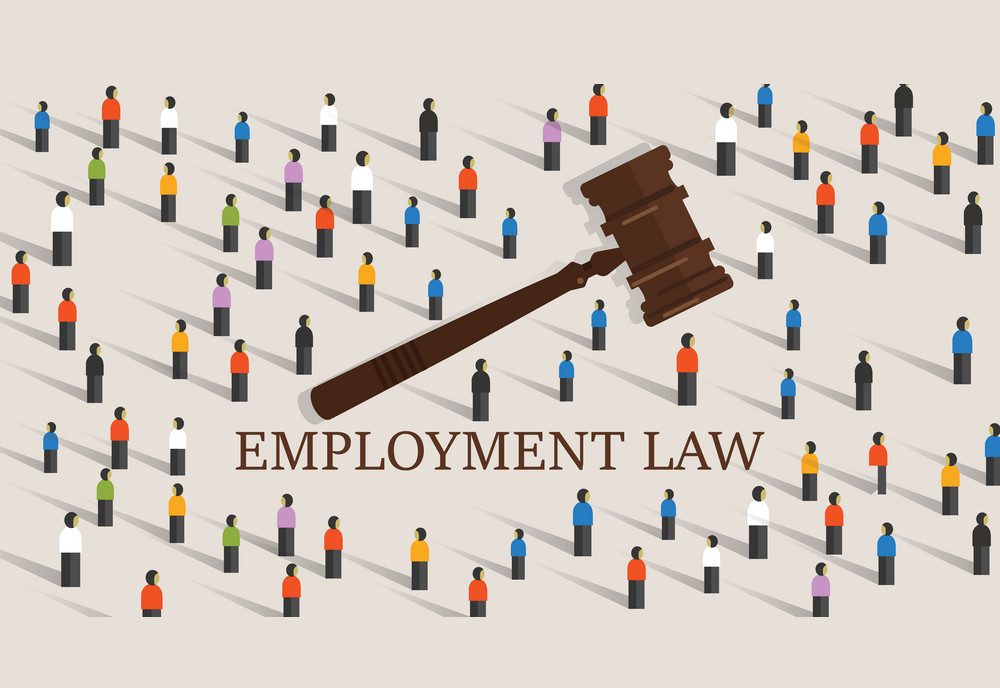The landscape of professional environments is continually evolving, influenced by a myriad of factors ranging from economic shifts to societal expectations. As organizations adjust to these dynamics, it is essential for both leaders and team members to remain informed about the pivotal modifications that could impact daily operations and workforce relations.
Recent revisions in the framework governing employment practices bring forth a variety of implications for all participants within the corporate arena. Staying abreast of these developments not only ensures compliance but also fosters a supportive and equitable atmosphere for all individuals involved.
In this exposition, we will delve into some of the significant updates that have emerged, spotlighting the aspects that professionals at any level should be aware of. Understanding these elements will aid in navigating the complexities of the current regulatory environment effectively and responsibly.
Overview of Recent Employer Law Updates
This section provides an insight into the evolution of regulations impacting workplaces. The landscape of employee rights and organizational responsibilities is continuously transforming, prompting a need for awareness among businesses and their workforce.
Among the noteworthy developments are:
- Enhanced protections for workers, ensuring fair treatment and equitable practices.
- Amendments related to wage structure, aimed at achieving greater financial consistency.
- Updated guidelines addressing workplace safety, reflecting a commitment to health standards.
- Provisions focusing on family and medical leave, supporting employees during significant life events.
These modifications highlight the ongoing commitment to fostering a balanced and supportive environment for all individuals engaged in various sectors.

Organizations should consider the following recommendations for effective compliance:
- Stay informed about local and national regulatory adjustments.
- Review and, if necessary, revise internal policies to align with new requirements.
- Engage in training programs to educate staff on updated practices.
- Consult legal experts to ensure comprehensive understanding and implementation.
Through proactive measures, businesses can navigate the shifting regulatory framework while enhancing their operational integrity and employee satisfaction.
Key Changes in Wage and Hour Regulations
This section highlights significant updates pertaining to compensation and working hours that have been introduced recently. These modifications aim to enhance employee rights, ensure fair pay, and clarify working conditions across various sectors.
- Minimum Wage Adjustments: Numerous jurisdictions have revised their minimum wage standards, resulting in increased pay for workers in numerous industries.
- Overtime Eligibility: New criteria for overtime eligibility have been established, impacting which employees qualify for additional compensation beyond standard working hours.
- Break and Meal Period Requirements: Some areas have adopted stricter regulations concerning required break and meal periods, assuring employees have sufficient time to rest and recuperate during shifts.
- Enforcement Mechanisms: Enhanced enforcement measures have been implemented to monitor compliance with wage and hour standards, including increased penalties for violations.
- Independent Contractor Classification: Revisions in the classification of independent contractors versus employees have significant implications for wage determination and benefits.
These developments reflect a growing commitment to fair labor practices and underscore the importance of being informed about the rights and responsibilities associated with compensation and work hours.
New Guidelines for Remote Work Policies
In today’s evolving work environment, organizations are rethinking their approaches to remote work. Establishing clear and effective policies is essential for maintaining productivity and employee satisfaction, while also addressing variety of challenges that arise when teams operate beyond traditional office settings.
Key Considerations for Remote Work Policies
When developing remote work guidelines, several essential factors must be taken into account. These considerations help create a balanced and fair framework that supports both business objectives and employee well-being.
| Consideration | Description |
|---|---|
| Flexibility | Allowing employees to choose their working hours can enhance productivity and work-life balance. |
| Communication | Implementing regular check-ins and updates ensures that teams stay connected and aligned on goals. |
| Technology | Providing necessary tools and resources is crucial for enabling effective collaboration and workflow. |
| Performance Tracking | Establishing clear metrics for evaluating employee performance remotely fosters accountability. |
| Security Protocols | Outlining cybersecurity measures protects both company and employee data in a remote setting. |
Implementation Strategies
Effectively rolling out remote work policies requires a thoughtful approach. Engaging employees in the process fosters ownership and encourages adherence to new guidelines. Training sessions and informational resources can help ease the transition, ensuring that everyone understands their roles and responsibilities within this new framework.
Impacts of Diversity and Inclusion Laws
The implementation of regulations promoting equity and representation within organizations has significantly reshaped workplace dynamics. These initiatives not only foster a more equitable environment but also influence organizational culture and performance metrics.
Increased Talent Pool: Businesses that embrace inclusivity expand their reach in attracting a wider array of candidates. This broader perspective can lead to a more qualified workforce, ultimately enhancing innovation and problem-solving capabilities.
Enhanced Employee Engagement: Work environments that prioritize diversity often see higher levels of employee satisfaction. When individuals feel valued and recognized for their unique contributions, overall morale improves, leading to increased productivity and retention rates.
Better Decision-Making: Diverse teams bring varied viewpoints and experiences to the table, fostering more comprehensive discussions. This diversity of thought can lead to improved decision-making processes, as teams can analyze issues from multiple angles.
Reputation and Brand Strength: A commitment to diversity and inclusion can bolster a company’s reputation in the market. Organizations that are perceived as socially responsible can attract customers and clients who prioritize ethical considerations in their purchasing decisions.
In conclusion, prioritizing inclusivity not only nurtures a harmonious workplace but also provides tangible benefits that can lead to the sustainable growth of organizations. The ripple effects of such initiatives resonate throughout the entire organizational structure and beyond.
Employee Rights Regarding Workplace Safety
Every individual working within an organization is entitled to a safe and healthy environment. Understanding and asserting these entitlements is crucial for both employees and employers. Ensuring safety at work contributes not just to individual well-being but also to overall productivity and morale.
Key rights related to workplace safety include:
- The right to a workplace free from recognized hazards that could potentially cause harm.
- The right to receive training on safety practices relevant to specific job roles.
- The right to request and receive personal protective equipment (PPE) at no cost.
- The right to report unsafe conditions without fear of retaliation.
Employees are encouraged to actively participate in safety programs and consult with management about potential risks. Companies are responsible for creating policies that promote a culture of safety and adhere to applicable regulations.
In cases where an employee feels their safety is compromised, they have several options:
- Document the unsafe conditions and communicate with supervisors.
- File a complaint with the relevant occupational safety authority if necessary.
- Seek support from employee advocacy organizations that specialize in workplace safety.
It is vital for workers to remain informed about their rights to ensure their protection and foster a healthier work environment for everyone involved.
Changes in Employee Classification Standards
The landscape of how workers are categorized has undergone significant transformation, affecting both businesses and their workforce. Accurate classification is vital as it determines various rights and obligations that affect wages, benefits, and overall job security. This section delves into the implications of these new classifications and their impact on the professional environment.
Implications for Worker Rights
With the revision of classification criteria, there are direct consequences for employee rights. Those classified as employees are entitled to a range of protections, including minimum wage, health benefits, and unemployment insurance. Conversely, independent contractors may not enjoy the same level of security. This delineation is essential in ensuring fair treatment and preventing exploitation.
Impact on Business Operations
Organizations must navigate the complexities of the updated classification standards to maintain compliance and avoid legal ramifications. Businesses might need to reassess their current workforce structure and implement new policies that reflect these classifications. Failure to align with the latest guidelines could result in financial penalties and damaged reputations.
Recent Developments in Family Leave Policies
The landscape of family leave provisions has undergone a transformation, reflecting a growing recognition of the importance of work-life balance. New measures and initiatives have been introduced to provide employees with greater support during critical moments in their personal lives. This evolution signifies a shift towards more inclusive practices aimed at addressing the diverse needs of the workforce.

Various jurisdictions have adapted their policies to create a more accommodating environment for employees seeking time away from work for family-related matters. These enhancements focus on ensuring that individuals can care for loved ones or manage personal situations without the fear of job loss or financial instability.
| Key Features | Description |
|---|---|
| Expanded Eligibility | Increased access to leave benefits for a broader range of familial relationships. |
| Paid Leave Initiatives | Introduction of financial support for employees during their time off, allowing for a more stable income. |
| Job Protection | Legal guarantees ensuring that individuals can return to their positions without repercussions. |
| Flexibility in Use | Provisions allowing leave to be taken intermittently or for various caregiving responsibilities. |
This progressive shift in family leave regulations marks a significant step towards enhancing the overall well-being of the workforce, fostering a more supportive and equitable professional environment. As these policies evolve, they hold the potential to profoundly impact the lives of countless individuals striving to balance their careers with family obligations.
Questions and answers: United states employer law changes
What are the most significant recent changes in U.S. employer laws that affect small businesses?
Recently, several key changes have been implemented that significantly impact small businesses. One of the most notable changes is the increase in the federal minimum wage, which has raised the baseline employees must be paid. Additionally, new regulations related to paid family leave have been enacted, requiring many small businesses to offer more comprehensive benefits to their workers. Employers are now also mandated to provide a safer workplace under stricter Occupational Safety and Health Administration (OSHA) guidelines, which include new reporting requirements for workplace injuries. Familiarizing yourself with these changes is crucial to ensure compliance and to avoid potential penalties.
How have the recent changes in employee classification laws affected gig workers?
The recent changes in employee classification laws, notably the updates to the criteria used to define independent contractors and employees, have had a significant impact on gig workers. Previously, many gig workers could classify themselves as independent contractors, allowing for greater flexibility. However, with new laws in place, particularly in states like California with Assembly Bill 5 (AB5), many gig workers may now be classified as employees, which entitles them to benefits like minimum wage, health insurance, and unemployment compensation. This shift has led to ongoing debates about the balance between gig economy flexibility and worker protections, prompting some companies to reevaluate their business models and worker agreements.
What do employers need to know about the new workplace anti-discrimination laws?
Employers should be aware that recent changes to workplace anti-discrimination laws have broadened the scope of protections for employees. Laws now often include provisions to protect against discrimination based on sexual orientation, gender identity, and pregnancy status. These updates mean employers must ensure their policies and training programs are not only compliant but also actively promote a diverse and inclusive workplace. Failure to comply with these anti-discrimination laws can result in significant legal liabilities. Employers should invest time in reviewing and updating employee handbooks, training sessions, and reporting mechanisms to handle any discrimination claims promptly and professionally.
Are there new regulations regarding employee health and safety during the COVID-19 pandemic?
Yes, there have been several new regulations affecting employee health and safety specifically related to the COVID-19 pandemic. The Occupational Safety and Health Administration (OSHA) has issued guidelines that require employers to provide a safe work environment, which includes implementing measures such as proper ventilation, mask mandates in certain settings, and protocols for reporting illness. In addition, employers may be mandated to provide paid sick leave for those who are affected by COVID-19, ensuring that employees do not feel pressured to work while sick. It’s essential for employers to stay informed about updates to these regulations, as they can vary by state and local jurisdiction.
What are the implications of the recent changes in federal labor laws for remote workers?
The implications of recent changes in federal labor laws for remote workers are significant. One such change includes a clearer delineation of the rights of remote employees regarding overtime pay and work hours. Employers are now required to track hours more meticulously for remote workers to ensure compliance with minimum wage and overtime regulations. This has led many companies to invest in software solutions for better time tracking. Moreover, as remote work continues to blur the lines between personal and professional time, employers are being encouraged to establish clear work-life balance policies. Fostering an inclusive remote work culture that protects employee rights and well-being is crucial for maintaining productivity and morale.
What significant changes were introduced by the Department of Labor in 2024 regarding overtime rules and salary thresholds?
In 2024, the Department of Labor implemented a new overtime rule that raises the salary threshold for eligible employees to receive overtime pay. Under this rule, employees earning below the specified salary will be entitled to overtime pay when they work more than 40 hours in a week. This change aims to enhance protections for workers and ensure that more employees are eligible for overtime pay, aligning with the Fair Labor Standards Act.
How do the new overtime rules affect employees in New York State compared to federal regulations?
The new overtime rules in New York State may provide greater protections than federal regulations. While federal law requires a minimum salary threshold for overtime eligibility, New York State has its own laws that often set higher standards. Employers in New York must comply with both state and federal overtime laws, which means they need to ensure that employees meet the higher salary threshold set by the state law while also adhering to the requirements of the Fair Labor Standards Act.
What implications do the new child labor laws have for employers and employees starting in 2024?
The new child labor laws enacted in 2024 impose stricter regulations on the employment of minors. Employers must ensure compliance with both federal and state child labor laws, which limit the hours and types of work that minors can perform. The law prohibits employers from employing minors in hazardous conditions and requires them to keep detailed records of the hours worked by minors. Employers must also provide notice to employees regarding these regulations to avoid penalties.
What steps should employers take to comply with the new employment law changes effective July 1, 2024?
To comply with the new employment law changes effective July 1, 2024, employers should review and update their employment contracts and policies to reflect the new salary thresholds and overtime rules. They must ensure that all eligible employees are correctly classified and that proper records are maintained to document work hours. Employers should also provide notice to employees about their rights under the new law, including information on overtime eligibility and protections against employment discrimination.
How does the National Labor Relations Act influence employee rights in the workplace as of 2024?
The National Labor Relations Act (NLRA) protects the rights of employees to engage in collective bargaining and to organize labor organizations. As of 2024, the NLRA continues to influence employee rights by prohibiting employers from interfering with the formation of unions and engaging in unfair labor practices. Employees may use their rights under the NLRA to negotiate terms and conditions of employment, including wages, hours, and working conditions, thereby promoting fair employment practices in the workplace.








